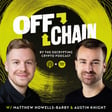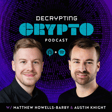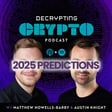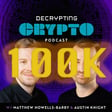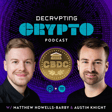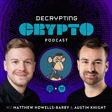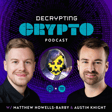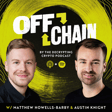Become a Creator today!Start creating today - Share your story with the world!
Start for free
00:00:00
00:00:01
![CBDCs: The [Dark] Future of Money (Part 2 of 2) image](https://media.zencastr.com/cdn-cgi/image/width=54,quality=85/image-files/61fc0461fb20e00040aeb09e/5b9f1396-2a8e-418d-82a0-30fd00969266.jpg)
CBDCs: The [Dark] Future of Money (Part 2 of 2)
This is the second of a two-part series where Matt and Austin take a deep dive into central bank digital currencies (CBDCs). This episode focuses on the arguments for and against their use.
Transcript
Introduction to the Podcast and Major Crypto Stories
00:00:12
Speaker
Hello, and welcome to the Decrypting Crypto Podcast. It's September 12th, 2024, and this is Off Chain, your weekly recap of the biggest stories in crypto space. I'm Matthew House-Barbie, and as always, I'm here with Austin Knight.
Series on Central Bank Digital Currencies (CBDCs)
00:00:26
Speaker
Austin, are you ready for our second part of our two-part series on CBDCs?
00:00:32
Speaker
Let's get into it, Matt. We really went deep last episode. If you haven't listened to that one yet, it's a great intro to what CBDCs are, some of the mechanics behind them, which I think are often described in very complex ways, but we broke it down in pretty simple lay person's terms.
Implementation and Growth of CBDCs
00:00:53
Speaker
And then also just some of the practical use cases and impacts that you could feel in your life from CBDCs.
00:01:01
Speaker
ah These are very much a real thing, right? ah they They very much are and they are. They are actively here today in yeah in many countries.
Politicization and Balanced Arguments on CBDCs
00:01:11
Speaker
um And we are going to see more and more of that happening.
00:01:16
Speaker
um I think this is something that is also becoming increasingly politicized, which you know we we called out a little bit in the last session, at the last but um episode that we did. And I want to further, just before we get into this,
00:01:36
Speaker
just make the point once again that yeah there are arguments for and against CBDCs.
Exploring Pros and Cons of CBDCs
00:01:45
Speaker
I try in any argument like this or or especially new technologies to not take a completely absolute view on on one side or the other, even if I feel very strongly against something. um And we'll try to do our best to touch on a lot of that. And especially I think in some of the areas in the arguments against CBDCs, they are very politicized and there can be a lot of over exaggeration.
00:02:20
Speaker
I don't think that's actually needed because I think there are a many, many really core pieces to this that are concerning enough without that.
Programmable Money: Thailand's Example
00:02:29
Speaker
But go in with this and our focus and the whole point of this two-part series really is to to cut through a lot of the noise, give you concrete examples of where this is happening today, share some thoughts that on where this could go without running wild in in our imagination. And talking through how this is going to influence what is almost certainly going to be the future of money in in many countries. um So yeah, with that, why don't we jump straight in? Let's do it.
00:03:14
Speaker
In the last episode, we gave some basic overviews
Thailand's Stimulus and Spending Restrictions
00:03:20
Speaker
of what CBDCs are. And one of the examples we touched on was in Thailand. In Thailand, the average annual salary is around 50% lower than that in the US. And as part of one of the Thai government's pledges to kind of drive less income inequality because while their salaries are very different, the income inequality is very similar in the US versus versus Thailand. I think it's around 50% of the total income made in the whole country is is captured by the top 10%.
00:04:02
Speaker
And one of the pledges that the Thai government made was that they would be distributing $12.5 billion dollars in stimulus payments to around 50 million of their their residents. This worked out as around about $280 for each individual Thai citizen that was but was um but was eligible, which is roughly half of the monthly per capita income of an individual. So you know not too far off the the COVID stimmies that we we we saw in the US. Now, why were we talking about stimulus payments?
00:04:39
Speaker
well What's interesting about these stimulus payments is not you know what they're going to do financially for the eligible recipients. It's rather more about what they can't do with this money. And I say money in the the loosest of terms, because they come with many strings. And those strings are the fact that once these funds are distributed,
00:05:08
Speaker
they The recipients will have six months to spend the money, or it will disappear from their account. Not only that, but the money can only be spent in, I quote, authorized um businesses located within a short perimeter of the registered home address of the individual.
00:05:28
Speaker
and you may be asking yourself, well, how are they going to police
Enforcing Rules with CBDCs in Thailand
00:05:31
Speaker
this? How are they going to enforce this? um How are they going to get the money back if it's not spent in time? And what are the consequences to residents if they don't follow these these rules? And I think these are all very, very good questions. These are good questions, but they're moot points. And the reason why they're moot points is this money doesn't require social contracts or laws per se to enforce this behavior um in the same way that things like capital controls are put in place to restrict capital flight out of the country. All of this is a social and legal kind of rules that are put in place and to be followed through on, enforcement needs to be taken for those that break those rules.
00:06:21
Speaker
In the case of this example in Thailand, these rules... for all intents and purposes, cannot be broken. This is from programmable money. It is issued by the Bank of Thailand, the central bank, and obviously heavily influenced by the Thai government.
Recap: CBDCs' Nature and Future Implications
00:06:39
Speaker
And this money is a central bank digital currency, CBDC. This is what we're talking about, programmable money issued, owned, and influenced by the central bank, and certainly influenced by the the government.
00:06:55
Speaker
So that's like a bit of a refresher. We talked a little bit about this. and We're not going to go too much into like all of the technical pieces because I think you can listen to the the last episode we did to learn a little bit more on this. But maybe Austin, we kind of fast forward now a little bit to touch on some of the implications of CBDCs coming into and And I must and i must ah ah really hammer home this point. I talked about Thailand. yeah and You may be thinking, Thailand, so what, right? This will be the UK. This will be the US. This will be every major economic power country that you are currently sitting in today.
00:07:48
Speaker
that will let minimum be the discussion of CBDCs.
Concerns: Financial Discrimination, Policy, Privacy, Security
00:07:52
Speaker
No doubt about it. That's why it's important for us to talk about it now while that can still be changed. I think that, you know, when we think about the, uh, arguments for and against CBDCs, categorically speaking, there are four major considerations that are very real that need to be made.
00:08:13
Speaker
when weighing whether or not a CBDC is going to be a net positive for a country and its citizens. I would bucket these as first financial discrimination or risk of financial discrimination, which is effectively what you were a talking talking about with Thailand, Matt. ah The second of which is unstable monetary policy, which there's so much detail on that we will be getting into.
00:08:41
Speaker
the third of which is privacy, concern, and then the fourth is security risk. So you were talking about uh, the, the case with Thailand, you know, financial discrimination, uh, related to that. I know that there was this really interesting op-ed in the financial times, um, that we talked about last week, which had some just incredibly insightful quotes in it. Uh, one of which was like, what was some of the stuff that you were looking at in there?
00:09:12
Speaker
I thought it was a fantastic piece. um ah The quote that we mentioned last week right ah was, it's not hard to envision a future in which CBDC usage is restricted to quote unquote, good citizens and quote, acceptable expenditures as deemed by the government. Now. what did Stop it.
00:09:42
Speaker
Yeah, there
Controlling Spending Patterns with CBDCs
00:09:43
Speaker
really is. And, you know, um that that is list like, no, it's not literally what's happening in Thailand. That is partially what's happening in Thailand. The thing with the I think the case, ah and I love talking about this specific case in Thailand, because it's very interesting ah to to observe, because if you don't know all of the other like realities of a CBDC and what it brings with it,
00:10:13
Speaker
That's a very strong argument, so it's a good thing. you know One of the toughest things about stimulus injections is that, one, they often get pulled into savings versus being stimulus, which is about stimulating an economy, driving growth, right which is spend this money. You need people to spend the money to stimulate the economy.
00:10:38
Speaker
Otherwise, it goes into savings and can be inflationary, which is the antithesis of stimulating the economy, right? And it makes people technically kind of worse off, even though it might not feel like it. The other piece is, well, how do you just stop people spending it outside of your economy?
00:10:56
Speaker
And even tougher, how do you stimulate local economies? right like What's just stopping Thai residents that get the stimulus checks, sending that money over to Jeff Bezos and ah the the wonders of Amazon? Is that really benefiting the ah the the Thai economy? Probably not. But if they have to spend it in local businesses,
00:11:19
Speaker
In their area, wow, that's a pretty good solve. Your local stimulus. And if it's not spent in six months, you know it can't go into savings. So it's going to it reduce the fact of inflation. This, if we just took take a step back from our view long term of CBDCs, is incredibly novel. And it is quite an impressive application for tackling some of the challenges. The problem comes in that When that stimulus is over, CBDCs don't just get shut down. Someone has to accept that as legal tender. It can't just be, this is no longer a money anymore and it's worthless. right It's now in the economy. and it is a For all intents and purposes, it's a secondary currency right ah that that is there, and it brings with it.
00:12:11
Speaker
So much more. So much more than this. And that's what I think we talked about around like the notion of good citizen. In the case of Thailand, we're talking about stimulus and welfare supporting those that are most in need. Not many people can argue against that that's a good thing to do at a high, high level. But When that isn't the criteria for either owning, what if, ah you know and I don't want to get into too many hypotheticals here, but aye convicted criminals can no longer hold CBDCs. And you go, okay, all right, fine. Then you're like, well,
00:12:55
Speaker
Who convicts people? And you know who makes the rules on that? And in, again, we talked about this last week, perfect world, no corruption. OK, maybe things don't go that bad. But this is an enormous power that can be wielded. Sure, you can freeze people's bank accounts, but you can't stop them holding cash. You take away their financial autonomy freedom and rights, you suffocate them. And yeah, maybe when you're thinking of the biggest, baddest, evil people, that might not sound so bad, but what about someone who maybe was smoking a joint and now all of a sudden their life is blown up? And I'm going to like backtrack from some of the hypothetical cause it gets into the realms of hyperbole here, but that is absolutely possible, right? And I think this is like the the future of of where we kind of go on on some of this.
00:13:52
Speaker
Yeah, I mean, you don't even have to take a hypothetical, right?
Government Financial Control and Past Events
00:13:56
Speaker
Matt, you were talking about freezing bank accounts. um Consider the Canadian Trucker protest, which was effectively protesting COVID vaccine mandates.
00:14:06
Speaker
And an unprecedented move Trudeau used the Emergencies Act to freeze hundreds of truckers bank accounts, despite the fact that these were legal domestic protests that didn't meet the pretty high requirements for invoking the Emergencies Act in the first place.
00:14:24
Speaker
Even so, this was super difficult to pull off. As I said, it was unprecedented because it involved the coordination of multiple Canadian banks, which were actually controlled by the government. And it was still difficult. OK, this would be exponentially more difficult to pull off in the US because our banking system is a bit more decentralized. It would be near impossible to pull this off with crypto. I guess you would just have to attack centralized exchanges. But like there's not too much that you can do there.
00:14:53
Speaker
but it'd be near instant with the CBDC. And in fact, much more effective because it's not freezing the bank account. It's emptying the bank account. It's rendering the currency useless. So ah do do you know do some of these examples that we're giving sound extreme and dystopic.
00:15:14
Speaker
Exactly. Absolutely. they That's exactly correct. They are that. um But is there some reality today that points toward this type of possibility or behavior as more of an evolution of something that's rather already happening rather than this being like the genesis of this type of thing. Absolutely. You know, financial discrimination where the government coerces individuals and companies by cutting off their supply of money. That's a real thing that's happening today.
00:15:50
Speaker
That's a legitimate threat with CBDCs, but the difference is that currently governments have to rely on third party officials, in this case, at banks, complying with their orders. CBDCs remove that hurdle. It was very politically difficult for Trudeau to pull that off. It brought a ton of backlash. Eventually, the accounts were unfrozen.
00:16:11
Speaker
you know It wasn't like this irreversible thing. um That's just not the case with CBDCs. There aren't really any checks and balances that you have to either go through or erode. You don't have to erode a justice system or you know the legitimacy of third party officials at banks.
00:16:30
Speaker
um you control Well, there's a single there's a single body that you have to influence right in in in the most democratic ah countries, right which would be the central bank.
CBDCs in Authoritarian Regimes
00:16:43
Speaker
And look, in in an ideal world, government should not have any influence over money issued by a central bank. But also you have a central point of failure in the central bank and the powers that they will also gain from this will be pretty substantial. I also think about, you know, you go to slightly different end of the spectrum in dictatorships and more authoritarian regimes, which are widespread around the world.
00:17:19
Speaker
The prize for gaining power in a country increases dramatically because you have unprecedented levels of power and control. um I mean, and Nigeria actually is ah is is an example where they are rolling out a CBDC right now. And I think that a lot of Africa will look to do this. um They are running several pilots.
00:17:48
Speaker
and i and just see where this doesn't fill me with a huge amount of of confidence in less stable governments. you want to control If you want to control a population, you control their money. That is the the the thing that is inescapable without cash,
00:18:08
Speaker
without the ability to have autonomy over you your money, it's incredibly hard to fight anything, actually. And the the fact, the ease of being able to control a lot of this is is is what's most worrying. But yeah it's not just about There's a lot of this, like, I think it's quite clear in many cases where the individual freedoms of individuals can be infringed upon. And if we go in this with the most rose-tinted glasses and you say, okay, well,
00:18:47
Speaker
the The money supply can also be impacted today in you know the the way that the central bank can yeah just print more cash, and that in itself is problematic. It's a very different piece, but there is also a fair amount of control over our money in many senses today. It's just felt less at the individual level and more at the kind of population level.
00:19:14
Speaker
And let's assume that a central bank digital currency comes into a country and there are so many controls in place that this level of power and control is not actually exerted in the in the way that we think is going to happen. Now, this is incredibly wishful thinking.
00:19:34
Speaker
But we push all that to one side. There are also many, many more concerns outside of just this that that we have to think about. I think one of these interesting areas is the way that this can change the landscape of retail banking, actually, with CBDCs in the mix.
Impact on Retail Banks and Monetary Policy
00:19:53
Speaker
And one of the things, we very briefly touched on this in ah the the last episode, but I want to touch on this a little bit more.
00:20:04
Speaker
Money and the supply, inflation, everything surrounding the basis of money is put to its test at most during times of crisis. And you see this in the most established economies in the world. You see this in the um most fragmented and disrupted and underprivileged economies in the world.
00:20:34
Speaker
Great example, go back to October, November of 2022 in the UK when we had the infamous Liz Truss come in as our prime minister and in what can only be described as an incredible achievement to crash the UK bond market and send sterling into one of its lowest points against the dollar in literally decades slash almost like a century, in the space of like a few weeks, you start to realize that when and all of your savings become less in such a small period of time, that there's a lot more at play here. And then we have the retail banking crisis in the US, where all of a sudden, like individuals, companies,
00:21:31
Speaker
just lost huge amounts of cash. and And you realize the fine balance of banks and retail banking across the world, really, the amount of capital that they actually need to to hold ah the the balances of their customers is incredibly low. We've been going through, and you may, if you follow some of this stuff, off the back of the 2008 financial crisis,
00:21:58
Speaker
retail banks were told, and and actually all banks were told that they had to um maintain now a new, I think it was 19% backing of their customer balances to how much they actually held in their banking reserves. They fought this tooth and nail, got this eventually down to 9%, which was an increase, by the way, on what it was before. So at any moment in time, banks, and this is largely even just like large big banks that are held to to account in this respect, not small, tiny retail banks. They hold around 9% of the actual amount of money that is in the customer balances. So when there's capital flight, like we saw with Silvergate and ah the SPB bank, all of a sudden you can have a very quick bank run and the whole thing collapses and there's a huge amount of knock on effect. Now, why am I talking about this? Well, CBDCs play a really
00:22:56
Speaker
interesting and unpredictable role when they're implemented into economy. Because one of the things that you could argue is that they could drain liquidity from retail banking sector. So we've seen what happens when retail banks face liquidity issues, right which we talked about. But in times of crisis,
00:23:18
Speaker
most capital moves to the safest areas. If you are worried that the cash in your bank is not sufficiently capitalized and there is a chance that the bank could face a bank run and go under and that you will lose all of the money that actually the bank technically owns right now and you don't even know which side topic. yeah so you will try right You will try and move those funds to an area that you deem to be most safe.
00:23:50
Speaker
Is that another bank? I don't know. This bank goes down. Is there going to be a knock-on effect and that bank goes down? Can I take it all out in cash? Probably not. You literally can't do that in many cases. It takes weeks to take out sizable amounts of cash anyway. And I don't know about you, but I don't love the idea of storing a ton of cash in your house, right?
00:24:10
Speaker
and So where do you put it? yeah If you're in the US, maybe Treasury bills. Why? Because it's a claim on the US government, which you're saying, OK, think of all the things that could like be that could collapse here. The US government is probably one of the last things. I'm going to do this as a claim on the US government. I'm going to buy Treasury bills. CBDCs would be a claim on the central bank.
00:24:36
Speaker
They issue those. It's not like they can be just like lost in a in a bank account, ah in a retail bank account. They are backed fully by the central bank. And if it happens so in the central bank, you have a claim on that in the same sense that you would with the Treasury bill on the US government.
00:24:52
Speaker
So in terms of a crisis, you can imagine that a lot of people would maybe want to take sizable amounts of their money out of retail banks and put them into the CBDC because categorically that would be a safer bet than putting it in the hands of a retail bank. This could be a real spiral. And yes, there's a lot of discussion around, okay, well, maybe you can set caps on, on the amount of CBDCs that you have in your,
00:25:21
Speaker
in in your wallet so that you know this can't happen. um Yeah, maybe. But I think one of the things here is that it can these caps could change. Does the does the the the CBDCs actually, does their use become incredibly limited if the most you can have is like a couple of thousand bucks in the in the wallet like at that point what's the point right you know like what is the point and I think you start getting into this piece where it's very easy to see that the mechanism and the dynamic that comes here and by the way just to be clear if
00:26:03
Speaker
people move funds out of the retail bank as capital flowing out of those banks, which further perpetuates this self-fulfilling cycle of like the bank's demise and then a knock on collapse. So, you know, and this is the kind of thing that happens. And then all of a sudden we come back to our first comment in times of a crisis.
00:26:22
Speaker
In times of a crisis, people move all of their wealth, the things that they they value most dearly to give them autonomy to avoid struggle, to preserve their kind of like freedom in in in times of crisis into a central bank digital currency. Unprecedented amounts of power and control is now possessed by the central bank. And in times of a crisis, what we often see is you know power can often be abused.
00:26:50
Speaker
um So you see how this that there's a lot of negative cycles that can that can happen in in all of this. And these are the scenarios that I think outside of just the day-to-day concerns of privacy and security, which are very valid, that concern me the most. Yeah. I mean, unstable monetary policy, it's probably the most universal concern with CBDCs. It's the thing that leads to some of those chained ah events.
00:27:26
Speaker
I guess you could say, change you know, change cycles where it's like you have one bad cycle, which maybe an isolation isn't bad, but it can lead to another one, which can lead to another one, which when you take a step back and look at the full picture, it looks pretty bad because effectively this means that government can easily mint new currency.
00:27:42
Speaker
automatically deduct taxes, even remove monetary supply or enforce negative interest rates, which we described negative interest rates in the last episode. To sum it up, it's basically just literally removing money from your bank account as it sits there. It's charging you an interest rate for holding currency.
00:28:01
Speaker
um In a time of crisis, in a time of corruption, in a time of centralization of power, ah That is scary because this means that there is no limit to the level of control that the government can exert over people if money is purely electronic and provided directly by the government. You give government control over the money going into and coming out of every person's account. and that The implications of that are huge. it's you know this isn't This isn't something that's happening now out outside of full-on totalitarian
00:28:40
Speaker
regimes. like you you know you You may see some parallels with the CCP. You say something you know bad on WhatsApp and then, or not on WhatsApp, on WeChat, and then Your WeChat account is shut down and oh, by the way, your WeChat account is your bank account. a Yeah. So there's this interesting quote from Eswar Prasad, a former IMF official. He said, quote, one should recognize that the CBDC creates new opportunity for monetary policy. If we all had CBDC accounts instead of cash.
00:29:14
Speaker
In principle, it might be possible to implement negative interest rates simply by shrinking balances in CBDC accounts. It will become a lot easier to undertake helicopter drops of money. If everybody had a CBDC account, you could easily increase the balance in those accounts.
00:29:32
Speaker
So here, um yeah inter draw speaking about this, that's what i'm here for the ad early airdrops yeah um he's speaking about this in a positive way, but you can ah pull out, you know, now through the lens of some of these concerns that we've discussed the, the, the negative side of this as well. um The flip side of helicopter drops is shrinking balances in CBDC accounts to implement negative interest rates. So in, um in other words, the central banks are taking money out of people's accounts to conduct monetary policy. It's like directory distribution.
00:30:05
Speaker
um so Which we talked about a ton in the last episode as well. So if if if you're listening and you haven't listened to that, you want to really understand the mechanics of it, we went into quite a lot of detail on on negative interest rates, which I think are particularly poignant to to understand like the the implications. The thing that I would really like anchor on here is, think back in history,
00:30:31
Speaker
to times where you know there were crises, there were changes in government or or ah centralization of power and what those governments attempted to do with the money. And think about the times where it succeeded and failed. And then think about the reasons why it failed. It's almost always logistical. This removes the logistical constraints. It's as simple as that.
00:30:59
Speaker
It's the disintermediation of you know governance around money.
Government Surveillance and Control with CBDCs
00:31:05
Speaker
ye There are a couple additional ah pieces of this that we wanted to touch on, which were privacy and security. i think you know Privacy is a rather obvious area of concern with this because effectively the CBDC would allow the government to see every transaction. In in some nations, this already happens. That doesn't mean it's okay to make it easier. That doesn't mean it's okay to make it happen in your nation because this means that every purchase, every transfer, every payment can and will be logged in a government database. There are huge implications for that. Even if you're doing something you know completely
00:31:40
Speaker
benign today. It may not be benign in the future. um You know, this allows for like surveillance over taxes. It allows for surveillance over your ah purchases that may or may not be acceptable to the government regardless of that. ah If the government wants they can easily block certain transactions that it deems to be illegal or undesirable ah depending on their policy around the cd CBDC. This could be anything from buying legal marijuana, paying an informal worker, or even remitting money to your family in blacklisted countries. Think about that.
00:32:20
Speaker
yeah i think that In some cases, you know many a lot of CBDCs, they they wouldn't be able to travel to residents that aren't like residents of the country. And then that would be a relatively common thing is that capital flight will will not be possible.
00:32:37
Speaker
with CBDCs. Absolutely. And i know I know what you may be thinking, right? Like, well, you know if the if if my government's preventing capital flight, I'm sure that there's a good reason for it in the same way that you may be thinking, I hated that Canadian trucker protest, and it was good that Trudeau shut down his bank accounts in the same way that you may be thinking, well, you know if criminals are breaking laws and they're laundering money with cash, then I like that the government can prevent that.
00:33:05
Speaker
I think that a good test for any principle is to take that scenario and then apply it to yourself or your cause or your good trouble. In the last episode, we talked about this concept of good trouble. I just mentioned buying marijuana, right? The culture around marijuana has totally changed in the United States and ah that you know that became a political process, but it started with ah you know a process that that was happening outside.
00:33:36
Speaker
of the law. Many good things are downstream of bad laws being broken. ah Your protest may not be the Canadian trucker protest. It may be something else. um And if the government, whoever is in power at the time, maybe it's not your person, maybe it's not your party at that time, deems ah that it shouldn't be happening, then all of a sudden you're going to find yourself ah understanding what it felt like to be a Canadian trucker pretty quickly.
00:34:07
Speaker
So yeahp I think that we we we have to approach CBDCs with principles, not with agendas, right? um And that's when these things start to have like, you you start to feel the implication of it. The final thing that I'll mention here is the security risk. I think that this one is like, we don't even have to go into much detail beyond on this beyond the fact that, as we mentioned, there's now one central bank yeah handling and controlling the CBDC or the currency instead of many. That's just one point of attack. ah So you know whether whether that be domestic or foreign, um the ah the less the the lower the points of attack,
00:34:46
Speaker
the increased risk that, that you have, um, you know, on your money. So I agree. I think there's a lot here as well. Right. Like, you know, and kind of even just like taking a step back again to, I think if I were listening to this and I was very pro CBDCs, um,
00:35:09
Speaker
And I try to be as objective as possible, I would argue. Well, look, Matt, look, Austin, you're sharing a lot of hypotheticals here. Yes, it's possible, right? But there's lots of things possible with with many technologies. Should we always take the the doomsday view of this, right? A lot of the scenarios, like what's the chances of a US government being like overthrown with an authoritarian, like government? like Yeah, that's pretty low.
00:35:38
Speaker
ah like that is low chance in the grand scheme of things not impossible, but the The thing that I will push is like when we talk about times of crises it doesn't necessarily need to be a change in the government moving towards being either more right or left, being ah more authoritarian, less authoritarian, ah anything even really related to that. What have we all just been through four years ago? We went through a pandemic and it basically gave every government around the world carte blanche to say, we need to put emergency measures in place. And everyone pretty much at the time was like, yeah,
00:36:23
Speaker
You can't go on planes. You can't go outside at certain times. You can't do X. And everyone's like, yeah, make the mistake. I'm sorry to to to be a ah bit doom and gloom. There will be another pandemic.
00:36:38
Speaker
This is the beginning of more of this in the future. And there will be something more akin to that, where we all agree that special measures need to be taken. And I think about little things in the pandemic that that came up. And what you got to kind of like, I talked about,
00:36:55
Speaker
you know some of the mechanisms for monetary policy and fiscal policy that often look like this like Rube Goldberg machine where they're trying like they're doing summing to influence summing that makes you eventually do summing that they hope. And there's this huge lag to get there. And this kind of just smashes the Rube Goldberg machine down and just goes straight to the source end piece of what they want to achieve. Great example. So the UK Conservative government They did this whole scheme as we were getting to the end parts of the pandemic when actually
00:37:31
Speaker
the small business economy was really struggling. And we needed to convince people, hey, you should go out and spend your money in restaurants. And, you know, it was a bit like, do I want to go to a restaurant? Like, I'm not sure. I still feel a bit strange about like COVID and all this stuff. Right. So then what they did is they incentivized small businesses to then give like discounts through stimulus. Right.
00:37:57
Speaker
This is the root Goldberg, right? Make discounting through stimulus that you give to local businesses to then pass that on to ah customers. That is inflationary, but you're kind of like, oh, i'll i'll I'll take the hit a little bit there and then encourage the savings that people have been holding through a pandemic because they're worried about a pandemic and dying, right? that To go and take from the savings, start spending in the economy again.
00:38:24
Speaker
Well, what if you just said, hey, OK, special measures. The money that's in your CBDC wallet will expire in six months if it's not spent within a perimeter of your home.
00:38:38
Speaker
yeah This is literally what Thailand are doing today. This is a real example. And of course, like why would that not be a piece? And I think in some cases, that wouldn't be as much uproar in times of crisis. And I just want to like highlight these pieces because it's that's a form of crisis that's very different to maybe what you're thinking, like a government being over it. Same thing, 2008, the financial crisis.
00:39:03
Speaker
to like a financial crisis, that's when you start to see these kind of like measures really take shape because people are so worried about everything else that that people are willing to trade freedom in those situations, even when they don't know it. And you know, this is when you kind of get into that really challenging cycle of events that that can can lead them to all of a sudden, it becomes the new normal.
00:39:31
Speaker
And this is how things operate. And more importantly, once it's out there, like the trains running, you can't stop it. It's in the economy, it's it's there, it's running, it's part of like the money, it's part of the infrastructure. um We talked a little bit about ah the amount of people using cash since the pandemic. and And I don't use cash, it's a very European thing not to use cash now.
00:39:54
Speaker
But it's been exacerbated in the ah in ah since the pandemic. And I mentioned the stat from Norway. I think something like 4% of all transactions are done in cash now since the pandemic. And that's the new normal. It's easy for how these things change. And the final piece that I want to kind of call out on my side in all of this that is really important to understand is being able to even have this money. So we talked about, okay, what if like these, ah the rules like could say that certain people can't have CBDCs or receive them, et cetera, et cetera. What happens if you are eligible? But one thing that you will absolutely need to do is you will need to have a wallet, you will need to register, you will need to KYC and you will need to give over identification. Now,
00:40:45
Speaker
I, which many people, maybe even you Austin, will disagree with my point of view on this around ID for voting. I am a huge advocate that we should not require identification documents to vote in democratic decisions. And my reasoning for this is that When you enforce identification, it discriminates against the lowest income individuals because statistically, people in lower income and more deprived conditions do not own ID. And the reason largely is because of the cost of identification right and even just the need right for for having it.
00:41:24
Speaker
Like in the UK, 83% of the the population ah have passports, right? How many do you think that is Austin off the top of your head in the US? It's like less than 50%.
00:41:40
Speaker
42%. Yeah. Right. So, you know, yeah and and yes, there is other state level identification, things like that is a bit different, but it does discriminate people. And it just blocks people from being able to to do this. Right. So There's just like additional layers here that like are important for some people, aren't important for others, but it is a fact that that will be an issue for for people as well. And there's no way that they couldn't get around the fact that you would need to have, like in the same way that we talk about in crypto, the challenge of the unbanked. One of the biggest reasons for being unbanked, especially in places like Africa, is the lack of identification and infrastructure around it.
00:42:21
Speaker
And you know this is the trade-off between centralized money that is digital and decentralized cryptocurrency that is you know um empowering.
00:42:35
Speaker
Well, Matt, you're right that I disagree with you on voter ID. but I knew you would. that's a whole That's a whole different podcast. You make a good point about it in the context of CBDCs and really just you know money in general. um Especially you know considering that, yeah, you know you need an ID to open a bank account, et cetera, et cetera. I mean, you need an ID to buy a beer, I guess. But um but you don't need an ID to have cash. Exactly, exactly. And this is the key. That's the problem here.
00:43:12
Speaker
Right. And you know, for people that are in need, um and and I'll call out as well, like when you talk about people that don't have ID, just to be clear, like, yeah, like some of those people are illegal immigrants. Most of them are not just to be clear on like what I like people that don't have ID. So there is a huge amount of citizens in every country.
00:43:34
Speaker
that do not have identification documents. So I'll just call out here, is like that's the other piece, and cache is really important for those people. right and And that's like a piece where, um we in the context of CBDCs, um it's It's an important factor. It's not the be all and end all. This is one piece that's important to understand because we talk about cash. I said in the first episode, you may be thinking, I don't care. I don't use cash. I hate cash. It's super annoying. It's inefficient. I hate having it in my wallet. I just Apple pay everything, like whatever. But it is ultimately the last form of government or central bank like issued
00:44:15
Speaker
money that you actually own yourself. Nothing else you do. All right.
Conclusion: Understanding CBDCs' Importance
00:44:24
Speaker
That was a rollercoaster. We said, before we recorded this, we were like, I think we can squeeze this into 30 minutes. and that was That was ambitious, as as we say on every episode. But I feel like we had a really good coverage. let's what ah What we're going to do is, you know we wanted to do this as a real big primer around this and dig deep into some of these areas.
00:44:44
Speaker
yeah it's It's an emotional topic for a lot of people. We'd love to hear people's thoughts around this, and um what we will definitely be doing, especially over the coming 12 months, is be following and sharing like any of these new kind of pilots, rollouts in countries, and and interesting information that's coming around CBDCs, because all of a sudden, it's going to be on your doorstep, and you're not going to know how it got here. I think it's important to, regardless of whether you are pro or against, is to be educated and informed around what's coming next. Yeah, certainly something that's going to be coming up a lot in our future news oriented episodes. So this will be a good resource going forward. Pay attention to the stuff when you see it mentioned, especially, you know, with ah related to pilots or tests or policy in your country. That's some really interesting stuff to dig into.
00:45:40
Speaker
And know that it is not crypto. It may get talked about like that. It may be compared to it, but it is the antithesis of it. And understanding that I think is a really important first building block in in all of this. yeah All right. I think we did ah our best job there of being impartial in places.
00:46:04
Speaker
ah it was fine it's It's tough. But Austin, as always, I'll see you next week. Yep, see you then man.
00:46:33
Speaker
The contents of the Decrypting Crypto podcast should not be used and are not intended as investment advice. Please do your own due diligence before making any investment, cryptocurrency or otherwise.
